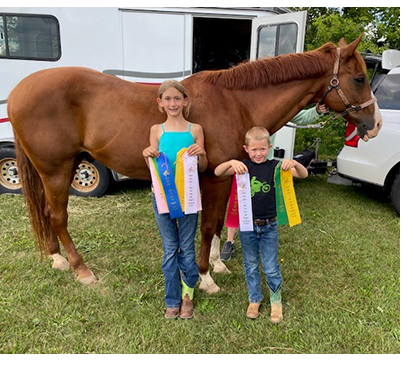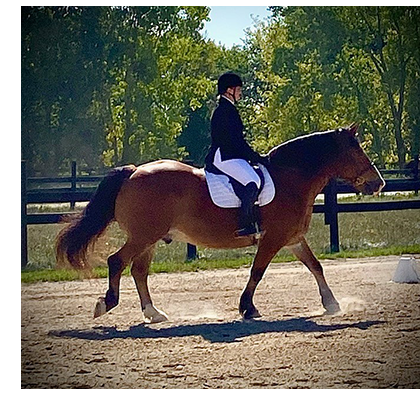Aimee Schmidt's incredible journey with horses

“When I was growing up, my mom had an old pony I learned to ride,” says Aimee, Licensed Service Specialist. “I eventually got too big for the pony, so I started saving money to buy my own horse when I was 16.”
Twelve years ago, Aimee acquired her current horse, Mooney, a Belgian and Quarter Horse cross. When Aimee and her husband, Mike, started a family, she found less time to ride and loaned Mooney to a local therapy program, Reins, which helps disabled individuals develop skills and confidence through learning to ride.
“Mooney wants nothing more than to please people, so he loved being a therapy horse,” Aimee says.

As her children, Addie and Ryker, became older, Aimee found more time to spend with Mooney. She began riding again, taking lessons with a trainer specialized in dressage, a form of riding and competition where both horse and rider focus on executing precise movements of increasing difficulty.
“Learning dressage was very challenging for both of us,” Aimee says. “Mooney is a short, heavy field horse breed, not the typical tall, lean dressage horse. Also, through the therapy program, he had focused only on walking straight and keeping a rider on his back rather than carrying himself in a particular way with a certain posture. I also had to learn to refine my movements to lead Mooney correctly.”
For a rider and horse to succeed in dressage, there is no substitute for practice and repetition.
“It’s taking things one step at a time and providing rewards after each correct move,” Aimee says. “A reward can be something as simple as a pat on the shoulder or a scratch on the head. It can even be the tone of your voice,” she says.
Last year, Aimee applied for a dressage clinic for non-dressage breeds with renowned trainer Stephen Hayes and was one of just five riders selected. “Being able to be taught by someone who has coached Olympic riders and has been in some of the highest levels of competition was a tremendous honor,” she says.
Addie loves riding and has found success in the ring with her horse, Vince. And while both mother and daughter enjoy the competitive aspects of riding, what Aimee has come to treasure most is the connection that develops between rider and horse.

“Horses have always been my ‘four-legged therapists.’ They don’t judge or hold grudges. They can feel your heartbeat from four feet away and sense whether you are anxious or calm,” she says.
"For any animal, particularly a prey animal like a horse, the neck and back are vulnerable areas they try to protect. Therefore, having a rider on their back is unnatural," Aimee says. "For a horse to allow you to be a rider—to put trust in you that you will treat them well and keep them safe—is a true privilege and honor."
An insurance company that cares about you and insuring the things you wish to be insured.
Get a Quote> Find an Agent>

